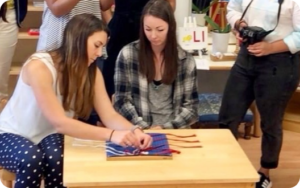Montessori education, a child-centered approach, is a beacon of independence, hands-on learning, and respect for a child’s natural psychological, physical, and social development. Pioneered by Dr. Maria Montessori in the early 1900s, this transformative educational method has been embraced by schools worldwide for its profound impact in fostering a love of learning and instilling intrinsic motivation and self-discipline.
Proper Montessori teacher training is crucial in ensuring that educators are well-equipped to create a nurturing and stimulating learning environment that adheres to the principles of Montessori education. Teachers must observe and understand each child’s needs, guide their learning experiences, and holistically foster their development.
This article delves into the nuances between online Montessori training and hybrid credential programs, equipping prospective teachers with comprehensive insights into each approach’s unique features and benefits. Grasping these differences will empower aspiring Montessori educators to make an informed choice, aligning their training program with their needs and career goals.
Understanding Montessori Training Programs
Montessori certification and credentialing are essential components for educators who wish to teach using the Montessori method. These credentials validate that the educator has undergone rigorous training and is equipped with the knowledge, skills, and understanding necessary to create a Montessori learning environment. Certification programs typically cover various levels, including Infant & Toddler, Early Childhood, Elementary, and Secondary education. Each program includes comprehensive coursework in Montessori philosophy, child development, classroom management, and practical training with Montessori materials.
Obtaining a Montessori certification involves completing a combination of theoretical and practical training courses. Theoretical training usually includes subjects like Montessori history, philosophy, and methodology, as well as child development theories and educational psychology. Hands on training happens in person in order for the adult learner to learn the curriculum and practice the specific presentations required to teach Montessori. Practical training, often called the practicum or internship, provides hands-on experience in a Montessori classroom under the supervision of an experienced Montessori educator. This balanced approach ensures that certified Montessori teachers are well-prepared to foster independent learning, creativity, and holistic development in children.
Importance of Choosing the Right Training Program
Choosing the right Montessori training program is crucial for aspiring Montessori educators. The quality of the training program directly impacts the educator’s ability to implement Montessori principles effectively in the classroom. A well-structured and comprehensive training program will equip teachers with the skills to create an environment that nurtures each child’s innate curiosity and love for learning.
Prospective teachers should consider several factors when selecting a training program:
- Curriculum: The program should offer a robust curriculum that covers all essential aspects of Montessori education, including both theoretical knowledge and practical skills.
- Faculty: Experienced and qualified faculty members are vital for delivering high-quality training. Instructors with extensive backgrounds in Montessori education and child development can provide valuable insights and guidance.
- Practical Training: Hands-on experience is a cornerstone of Montessori education. Programs that offer ample opportunities for in person learning with the materials along with practicum experiences in authentic Montessori classrooms are preferable.
- Support and Resources: Look for programs that provide strong support systems, including mentorship, career guidance, and access to Montessori resources and materials.
What Affiliations and Accreditations to Look For
When selecting a Montessori training program, it’s important to ensure that the program is affiliated with reputable Montessori organizations and accredited by recognized accrediting bodies. These affiliations and accreditations serve as a mark of quality and adherence to the highest standards of Montessori education.
- American Montessori Society (AMS): AMS is the largest Montessori organization in the world, providing affiliation for teacher education programs that meet their rigorous standards. AMS affiliation of Teacher Education Programs ensures that the program offers comprehensive training in line with Montessori principles.
- Montessori Accreditation Council for Teacher Education (MACTE): MACTE is the only accrediting body for Montessori teacher education programs. MACTE accreditation signifies that the program adheres to stringent academic and practical training standards, preparing teachers to deliver high-quality Montessori education. MACTE is recognized by the United States Department of Education (USDE).
- Association Montessori Internationale (AMI): Founded by Maria Montessori herself, AMI sets high standards for Montessori education globally. Programs affiliated with AMI are recognized for their adherence to the original Montessori principles and methodologies.
- International Montessori Council (IMC): IMC is another respected organization that accredits Montessori teacher education programs. An IMC-affiliated program provides assurance of quality training that aligns with international Montessori standards.
Affiliations with these organizations indicate that the training program is committed to providing high-quality education and maintaining the integrity of Montessori principles. Prospective Montessori teachers should prioritize programs with these affiliations to ensure they receive the best possible training and credentials recognized worldwide.
Montessori Training Online: Pros and Cons
Definition and Structure of Montessori Training Online Programs
Montessori training online programs provide an alternative to traditional in-person or hybrid training by offering coursework and instructional content through digital platforms. These programs are designed to deliver the theoretical aspects of Montessori education, including the philosophy, methodology, and child development theories, through video lectures, reading materials, and online discussions. While convenient, they often lack the practical, hands-on components that are essential to Montessori teacher training.
Advantages of Online Training
- Flexibility: Online Montessori training programs allow students to learn at their own pace and on their own schedule. This flexibility is especially beneficial for individuals who are balancing work, family, and other commitments.
- Accessibility: These programs make Montessori training accessible to individuals who may not have access to in-person or hybrid training centers due to geographical or logistical constraints. This can open up opportunities for aspiring Montessori teachers from diverse backgrounds and regions.
- Cost-Effective: Online programs often have lower tuition fees and eliminate the need for travel and accommodation expenses, making Montessori training more affordable for many students.
- Resource Availability: Students can access a wealth of online resources, including recorded lectures, digital libraries, and forums for discussion with peers and instructors.
Disadvantages of Online Training
- Lack of Hands-On Experience: One of the major drawbacks of online Montessori training is the lack of practical, hands-on experience with Montessori materials. This hands-on component is crucial for developing the skills needed to effectively implement Montessori methods in the classroom.
- Limited Interaction: Online programs may offer limited to no opportunities for face-to-face interaction with instructors and peers. This can hinder the development of a supportive learning community and reduce opportunities for real-time feedback and collaborative learning.
- Independent Diplomas Only: Online programs typically offer independent diplomas, which may not be recognized by major organizations like the American Montessori Society (AMS). This means that graduates of fully online programs may not receive an AMS or AMI credential, which is often required by many Montessori schools.
- Quality Variability: The quality of online Montessori training programs can vary widely. Prospective students need to carefully research and select programs that maintain high standards and provide comprehensive support.
AMS Credential Not Offered for Online Programs
It’s important to note that AMS, a leading body for Montessori education, does not offer credentials for entirely online programs. AMS requires a significant portion of the training to be conducted in person to ensure that teachers gain the necessary hands-on experience and direct interaction with Montessori materials. This distinction emphasizes the importance of in-person components in Montessori teacher training and highlights the limitations of fully online programs.
Hybrid Montessori Credential Programs: Pros and Cons
Definition and Structure of Hybrid Montessori Credential Programs
Hybrid Montessori credential programs combine the best of both online and in-person learning experiences. These programs typically include online coursework for theoretical learning and in-person sessions for practical, hands-on training. The online component allows students to access lectures, reading materials, and participate in discussions at their own pace. The in-person component usually involves workshops, classroom observations, and practical sessions with Montessori materials, ensuring that students receive comprehensive training along with support and mentorship.
Advantages of Hybrid Training
- Combination of Flexibility and Hands-On Experience: Hybrid programs offer the flexibility of online learning while providing essential hands-on experience. Students can complete theoretical coursework online, which allows them to manage their schedules effectively. The in-person sessions ensure that they gain practical skills and experience with Montessori materials, which are crucial for effective teaching.
- Comprehensive Learning: By integrating both online and in-person components, hybrid programs ensure a well-rounded education. Students benefit from the convenience of online learning and the depth of understanding that comes from direct interaction with instructors and peers during in-person sessions.
- Accreditation and Recognition: Hybrid programs often meet the high standards set by bodies like the Montessori Accreditation Council for Teacher Education (MACTE) and American Montessori Society (AMS). This means that graduates receive recognized credentials that enhance their career prospects and are valued by Montessori schools globally.
- Networking and Mentorship Opportunities: In-person sessions provide opportunities for students to network with peers, instructors, and professionals in the Montessori community. These connections can be invaluable for professional growth and development. The support through mentorship that comes with the real-time discussions and interactions is so critical to a teachers development.
Disadvantages of Hybrid Training
- Scheduling Challenges: Hybrid programs require students to balance online coursework with scheduled in-person sessions. This can be challenging for individuals with busy schedules or those who have other commitments.
- Travel Requirements: In-person components often require travel to designated training centers. This can incur additional costs and time commitments, especially for students who do not live near the training locations.
- Cost Considerations: While hybrid programs may be more cost-effective than entirely in-person programs, they can still be more expensive than fully online programs due to organizational affiliation and accreditation costs.
Key Differences Between Montessori Training Online and Hybrid Programs
Curriculum and Course Delivery Methods
Montessori training online programs primarily deliver their curriculum through digital platforms. These programs can use video lectures, reading materials, and online discussions to cover the theoretical aspects of Montessori education. Students can access these resources at their own pace, providing a high degree of flexibility.
In contrast, hybrid programs blend online coursework with in-person sessions. While the theoretical components are covered online, the practical elements are addressed during in-person workshops and classroom observations. This structure ensures that students not only understand the Montessori philosophy but also apply it in real-world settings.
Interaction with Instructors and Peers
Online programs often offer limited to no real-time interaction with instructors and peers. Communication typically occurs through discussion forums, emails, and occasional live webinars. This mode of interaction can sometimes feel impersonal and may lack the benefits of face-to-face communication.
Hybrid programs, however, incorporate online and in-person sessions, allowing for direct interaction with instructors and peers. These sessions facilitate immediate feedback, collaborative learning, and the development of a supportive learning community. The opportunity to engage in hands-on activities and discussions enhances the learning experience and builds stronger professional relationships.
Hands-On Experience and Practicum Opportunities
One of the most significant differences between online and hybrid programs is the availability of hands-on experience. Online Montessori training programs often lack the practical component, which is crucial for mastering the use of Montessori materials and teaching methods.
Hybrid programs provide extensive hands-on training through in-person workshops and practicum opportunities. These practical experiences allow students to work directly with Montessori materials, observe classrooms, and practice teaching under the supervision of experienced educators. This hands-on approach is essential for developing the skills needed to create effective Montessori learning environments.
Assessment and Evaluation Methods
Assessment methods in online programs are typically limited to quizzes and exams. These assessments evaluate the theoretical understanding of Montessori principles but may not effectively measure practical teaching skills.
Hybrid programs use a combination of online assessments and in-person evaluations. In-person components include observations, practical exams, and feedback from supervising teachers during the practicum. This comprehensive assessment approach ensures that students are not only knowledgeable about Montessori theory but also proficient in applying it in classroom settings.
Type of Credential Offered
The type of credential offered by Montessori training programs varies significantly. Many online programs provide independent diplomas or certifications, which may not be recognized by major organizations like the American Montessori Society (AMS) or the Association Montessori Internationale (AMI).
Hybrid programs, on the other hand, often meet the rigorous standards set by AMS and the Montessori Accreditation Council for Teacher Education (MACTE). For instance, the AMS Early Childhood Credential, which requires in-person coursework hours and a practicum, is only available through programs that include substantial hands-on training. This credential is highly valued by Montessori schools and can significantly enhance career opportunities for graduates.
Why Hands-On Experience is Crucial in Montessori Training
Importance of Practical Learning in Montessori Education
Montessori education is inherently practical, focusing on hands-on learning to foster independence, creativity, and critical thinking in children. This educational approach relies heavily on the use of specialized materials and interactive activities that require teachers to be well-versed in practical application. Therefore, practical learning is not just a component of Montessori training; it is foundational. Engaging with materials, practicing classroom techniques, and experiencing the Montessori environment firsthand are essential for truly understanding and implementing Montessori principles.
Benefits of Classroom Observations and Practicum
Classroom observations and practicum experiences are integral parts of Montessori training. Observing experienced Montessori educators in action allows trainees to see the theoretical principles they have learned applied in real-life settings. This observation helps in understanding classroom dynamics, effective management strategies, and the subtle nuances of Montessori teaching.
During the practicum, trainees get the opportunity to apply their knowledge in a supervised environment. They interact with children, use Montessori materials, and conduct lessons under the guidance of a seasoned Montessori teacher. This hands-on experience is invaluable for building confidence and competence in implementing Montessori methods.
How Hands-On Experience Enhances Teaching Skills and Effectiveness
- Mastery of Montessori Materials: The Montessori method uses specific materials designed to teach various concepts. Hands-on experience ensures that trainees become proficient in using these materials, understanding their purposes, and knowing when and how to introduce them to children.
- Development of Classroom Management Skills: Practical experience in a Montessori classroom helps trainees develop essential classroom management skills. They learn how to create a prepared environment that fosters independence and respect, how to observe and respond to individual needs, and how to guide children without interrupting their learning process.
- Real-Time Feedback and Improvement: During hands-on training, trainees receive immediate feedback from supervising teachers and instructors. This feedback is crucial for identifying strengths and areas for improvement, allowing trainees to refine their techniques and approaches.
- Building Confidence: Practical experience builds confidence in teaching abilities. As trainees practice and observe the positive impact of their methods, they gain the assurance needed to lead their own classrooms effectively.
- Fostering a Deeper Understanding: Engaging directly with children and the Montessori environment fosters a deeper understanding of the Montessori philosophy. Trainees witness the profound effects of the Montessori method on children’s development, reinforcing their commitment to this educational approach.
How Montessorita Can Help: Our Approach to Montessori Training
Overview of Montessorita’s Training Program
At Montessorita, we are dedicated to providing high-quality Montessori teacher training that prepares educators to create nurturing and effective learning environments. Our training program is designed to be comprehensive, integrating both theoretical knowledge and practical application. Trainees at Montessorita engage in a blend of online coursework and in-person sessions, ensuring a well-rounded education that adheres to the highest standards set by the American Montessori Society (AMS) and the Montessori Accreditation Council for Teacher Education (MACTE).
Our program covers all essential aspects of Montessori education, including Montessori philosophy, child development, classroom management, and the use of Montessori materials. Through a combination of interactive online modules, engaging lectures, and hands-on workshops, we ensure that our trainees are fully equipped to implement Montessori principles in their classrooms.
Explanation of Why Montessorita Does Not Offer Fully Online Classes
Montessorita firmly believes in the importance of hands-on experience in Montessori training. While online classes offer flexibility and accessibility, they cannot fully replicate the practical learning that occurs in a physical classroom. Montessori education is deeply rooted in the use of specific materials and interactive activities, which require direct engagement and practice.
To maintain the integrity and quality of our training, we do not offer fully online classes. Our hybrid programs ensure that trainees receive the necessary in-person training to master the use of Montessori materials and develop effective classroom management skills. This approach aligns with the standards of AMS and MACTE, which require in-person components for certification.
Benefits of Montessorita’s Hybrid Programs
- Comprehensive Training: Our hybrid programs provide a thorough education in Montessori principles, combining online theoretical coursework with synchronous zoom meeting and in-person practical training. This ensures that trainees are well-prepared to implement Montessori methods in real-world settings.
- Hands-On Experience: By incorporating in-person sessions and practicum opportunities, our programs allow trainees to gain valuable hands-on experience. This practical training is crucial for developing the skills needed to use Montessori materials and manage a classroom effectively.
- Personalized Support: At Montessorita, we offer personalized support to each of our trainees. Our experienced instructors provide guidance, feedback, and mentorship throughout the training process, helping trainees refine their techniques and build confidence.
- Access to Resources: Trainees at Montessorita have access to a wealth of resources, including Montessori materials, a dedicated online learning platform, and a supportive learning community. These resources enhance the learning experience and provide ongoing support beyond the completion of the program.
- Career Opportunities: Our hybrid programs are recognized by AMS and MACTE, ensuring that our graduates hold credentials that are highly valued by Montessori schools worldwide. This opens up a wide range of career opportunities for our certified teachers. Plus, we have a pretty great reputation in the industry for preparing amazing Montessori teachers!
We invite you to explore our website to learn more about our Montessori teacher training programs. Discover how Montessorita can help you achieve your career goals and provide the comprehensive training you need to excel in Montessori education.
Contact Details for Inquiries and Enrollment Assistance
For any questions or assistance with enrollment, please do not hesitate to contact us:
- Phone: 949-242-0250
- Email: info@montessorita.com



